Nursing Care Plan for Mrs. Janet
VerifiedAdded on 2020/02/24
|8
|2122
|148
AI Summary
This assignment focuses on developing a detailed nursing care plan for Mrs. Janet, a patient requiring both physical and psychological support. The plan emphasizes the importance of assessing Mrs. Janet's nutritional status, vitamin and protein intake, as well as her mental and emotional health. It highlights the need for clear communication, regular follow-ups, and psychosocial care to ensure her holistic recovery.
Contribute Materials
Your contribution can guide someone’s learning journey. Share your
documents today.
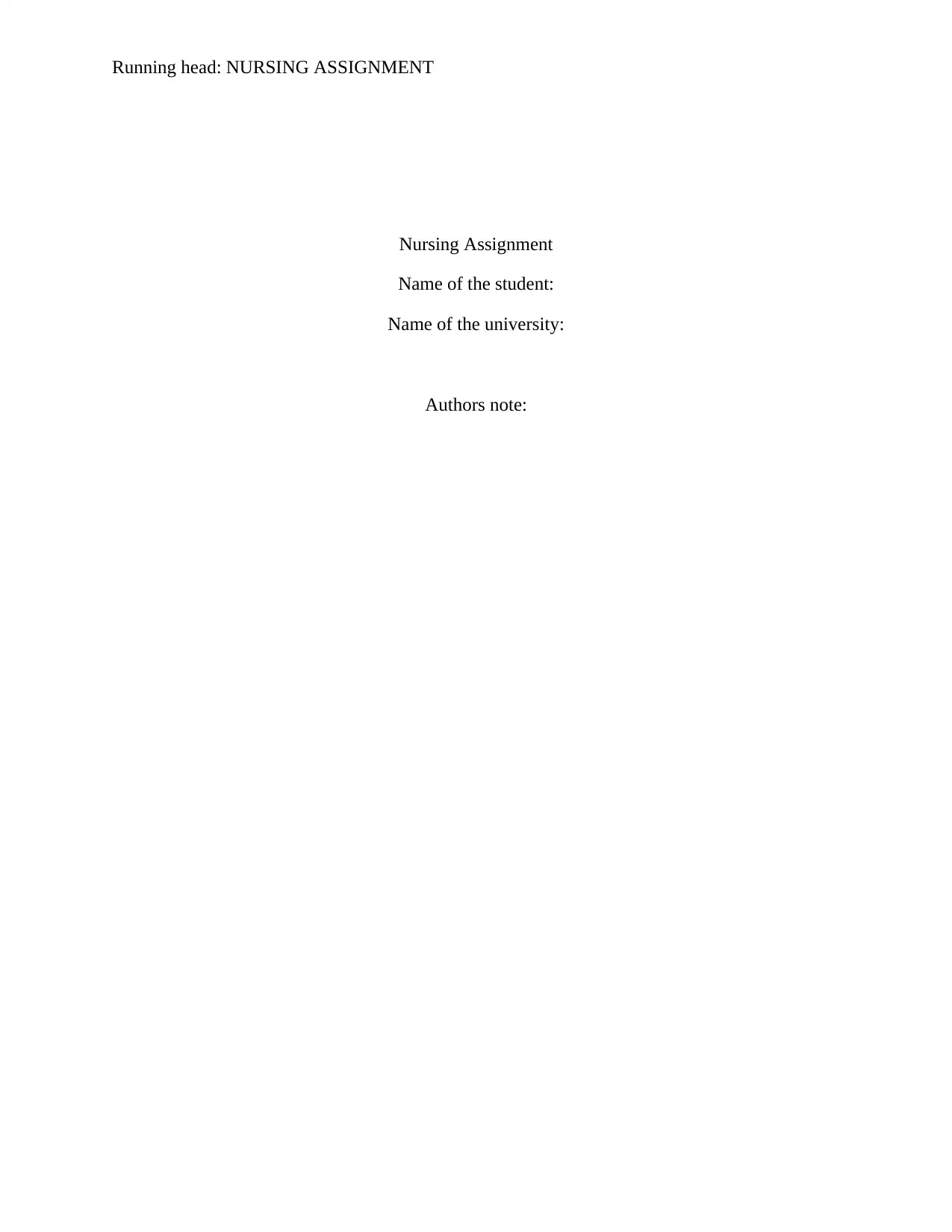
Running head: NURSING ASSIGNMENT
Nursing Assignment
Name of the student:
Name of the university:
Authors note:
Nursing Assignment
Name of the student:
Name of the university:
Authors note:
Secure Best Marks with AI Grader
Need help grading? Try our AI Grader for instant feedback on your assignments.
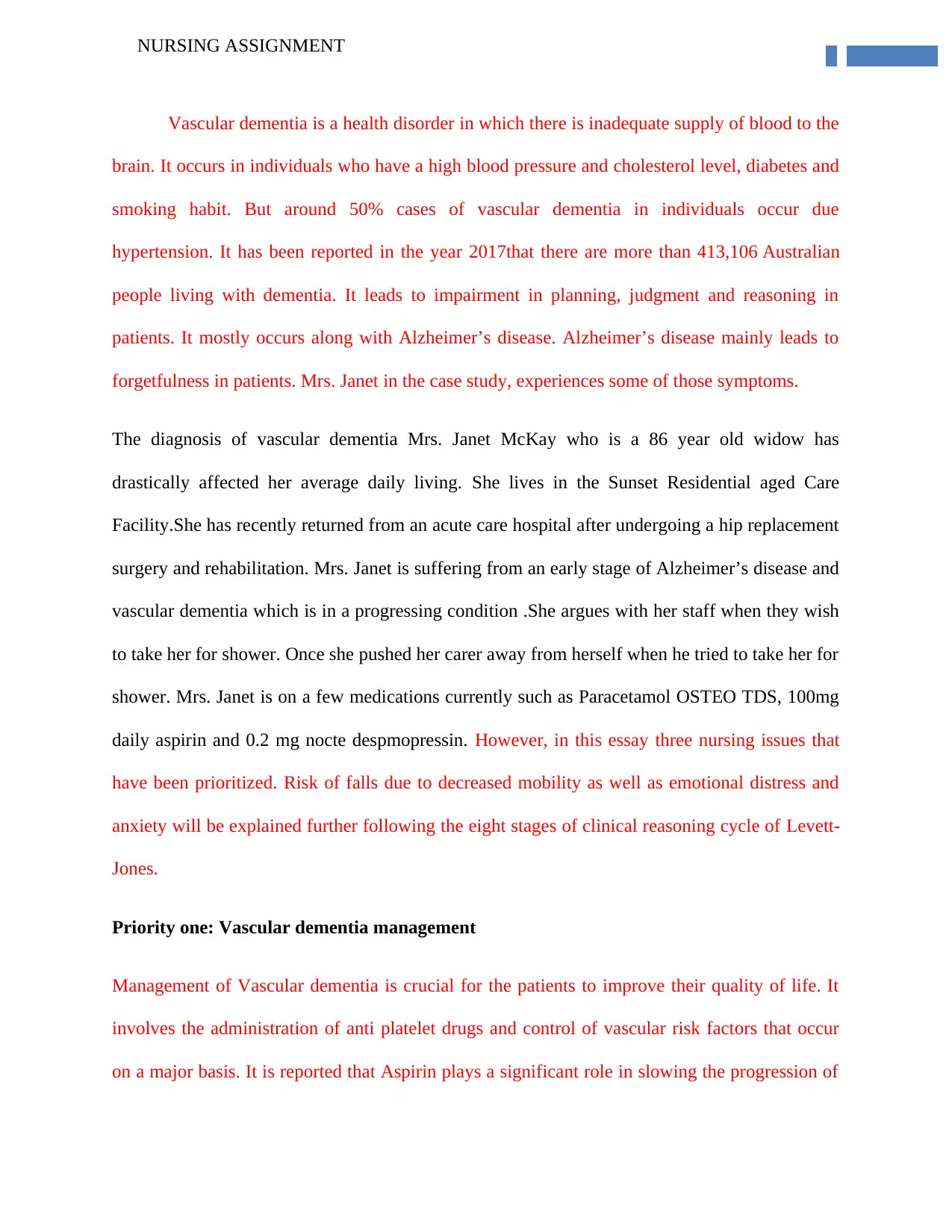
1
NURSING ASSIGNMENT
Vascular dementia is a health disorder in which there is inadequate supply of blood to the
brain. It occurs in individuals who have a high blood pressure and cholesterol level, diabetes and
smoking habit. But around 50% cases of vascular dementia in individuals occur due
hypertension. It has been reported in the year 2017that there are more than 413,106 Australian
people living with dementia. It leads to impairment in planning, judgment and reasoning in
patients. It mostly occurs along with Alzheimer’s disease. Alzheimer’s disease mainly leads to
forgetfulness in patients. Mrs. Janet in the case study, experiences some of those symptoms.
The diagnosis of vascular dementia Mrs. Janet McKay who is a 86 year old widow has
drastically affected her average daily living. She lives in the Sunset Residential aged Care
Facility.She has recently returned from an acute care hospital after undergoing a hip replacement
surgery and rehabilitation. Mrs. Janet is suffering from an early stage of Alzheimer’s disease and
vascular dementia which is in a progressing condition .She argues with her staff when they wish
to take her for shower. Once she pushed her carer away from herself when he tried to take her for
shower. Mrs. Janet is on a few medications currently such as Paracetamol OSTEO TDS, 100mg
daily aspirin and 0.2 mg nocte despmopressin. However, in this essay three nursing issues that
have been prioritized. Risk of falls due to decreased mobility as well as emotional distress and
anxiety will be explained further following the eight stages of clinical reasoning cycle of Levett-
Jones.
Priority one: Vascular dementia management
Management of Vascular dementia is crucial for the patients to improve their quality of life. It
involves the administration of anti platelet drugs and control of vascular risk factors that occur
on a major basis. It is reported that Aspirin plays a significant role in slowing the progression of
NURSING ASSIGNMENT
Vascular dementia is a health disorder in which there is inadequate supply of blood to the
brain. It occurs in individuals who have a high blood pressure and cholesterol level, diabetes and
smoking habit. But around 50% cases of vascular dementia in individuals occur due
hypertension. It has been reported in the year 2017that there are more than 413,106 Australian
people living with dementia. It leads to impairment in planning, judgment and reasoning in
patients. It mostly occurs along with Alzheimer’s disease. Alzheimer’s disease mainly leads to
forgetfulness in patients. Mrs. Janet in the case study, experiences some of those symptoms.
The diagnosis of vascular dementia Mrs. Janet McKay who is a 86 year old widow has
drastically affected her average daily living. She lives in the Sunset Residential aged Care
Facility.She has recently returned from an acute care hospital after undergoing a hip replacement
surgery and rehabilitation. Mrs. Janet is suffering from an early stage of Alzheimer’s disease and
vascular dementia which is in a progressing condition .She argues with her staff when they wish
to take her for shower. Once she pushed her carer away from herself when he tried to take her for
shower. Mrs. Janet is on a few medications currently such as Paracetamol OSTEO TDS, 100mg
daily aspirin and 0.2 mg nocte despmopressin. However, in this essay three nursing issues that
have been prioritized. Risk of falls due to decreased mobility as well as emotional distress and
anxiety will be explained further following the eight stages of clinical reasoning cycle of Levett-
Jones.
Priority one: Vascular dementia management
Management of Vascular dementia is crucial for the patients to improve their quality of life. It
involves the administration of anti platelet drugs and control of vascular risk factors that occur
on a major basis. It is reported that Aspirin plays a significant role in slowing the progression of
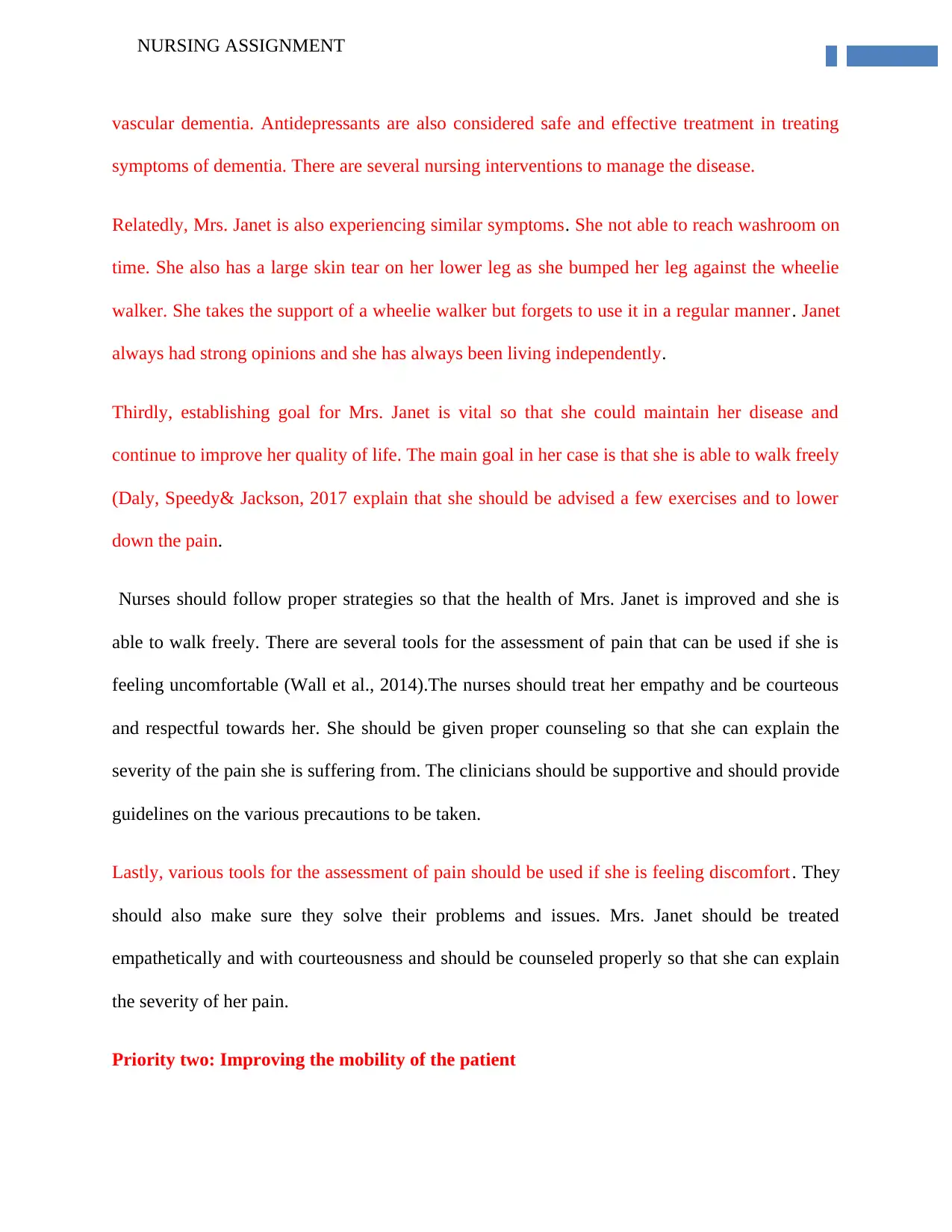
2
NURSING ASSIGNMENT
vascular dementia. Antidepressants are also considered safe and effective treatment in treating
symptoms of dementia. There are several nursing interventions to manage the disease.
Relatedly, Mrs. Janet is also experiencing similar symptoms. She not able to reach washroom on
time. She also has a large skin tear on her lower leg as she bumped her leg against the wheelie
walker. She takes the support of a wheelie walker but forgets to use it in a regular manner. Janet
always had strong opinions and she has always been living independently.
Thirdly, establishing goal for Mrs. Janet is vital so that she could maintain her disease and
continue to improve her quality of life. The main goal in her case is that she is able to walk freely
(Daly, Speedy& Jackson, 2017 explain that she should be advised a few exercises and to lower
down the pain.
Nurses should follow proper strategies so that the health of Mrs. Janet is improved and she is
able to walk freely. There are several tools for the assessment of pain that can be used if she is
feeling uncomfortable (Wall et al., 2014).The nurses should treat her empathy and be courteous
and respectful towards her. She should be given proper counseling so that she can explain the
severity of the pain she is suffering from. The clinicians should be supportive and should provide
guidelines on the various precautions to be taken.
Lastly, various tools for the assessment of pain should be used if she is feeling discomfort. They
should also make sure they solve their problems and issues. Mrs. Janet should be treated
empathetically and with courteousness and should be counseled properly so that she can explain
the severity of her pain.
Priority two: Improving the mobility of the patient
NURSING ASSIGNMENT
vascular dementia. Antidepressants are also considered safe and effective treatment in treating
symptoms of dementia. There are several nursing interventions to manage the disease.
Relatedly, Mrs. Janet is also experiencing similar symptoms. She not able to reach washroom on
time. She also has a large skin tear on her lower leg as she bumped her leg against the wheelie
walker. She takes the support of a wheelie walker but forgets to use it in a regular manner. Janet
always had strong opinions and she has always been living independently.
Thirdly, establishing goal for Mrs. Janet is vital so that she could maintain her disease and
continue to improve her quality of life. The main goal in her case is that she is able to walk freely
(Daly, Speedy& Jackson, 2017 explain that she should be advised a few exercises and to lower
down the pain.
Nurses should follow proper strategies so that the health of Mrs. Janet is improved and she is
able to walk freely. There are several tools for the assessment of pain that can be used if she is
feeling uncomfortable (Wall et al., 2014).The nurses should treat her empathy and be courteous
and respectful towards her. She should be given proper counseling so that she can explain the
severity of the pain she is suffering from. The clinicians should be supportive and should provide
guidelines on the various precautions to be taken.
Lastly, various tools for the assessment of pain should be used if she is feeling discomfort. They
should also make sure they solve their problems and issues. Mrs. Janet should be treated
empathetically and with courteousness and should be counseled properly so that she can explain
the severity of her pain.
Priority two: Improving the mobility of the patient
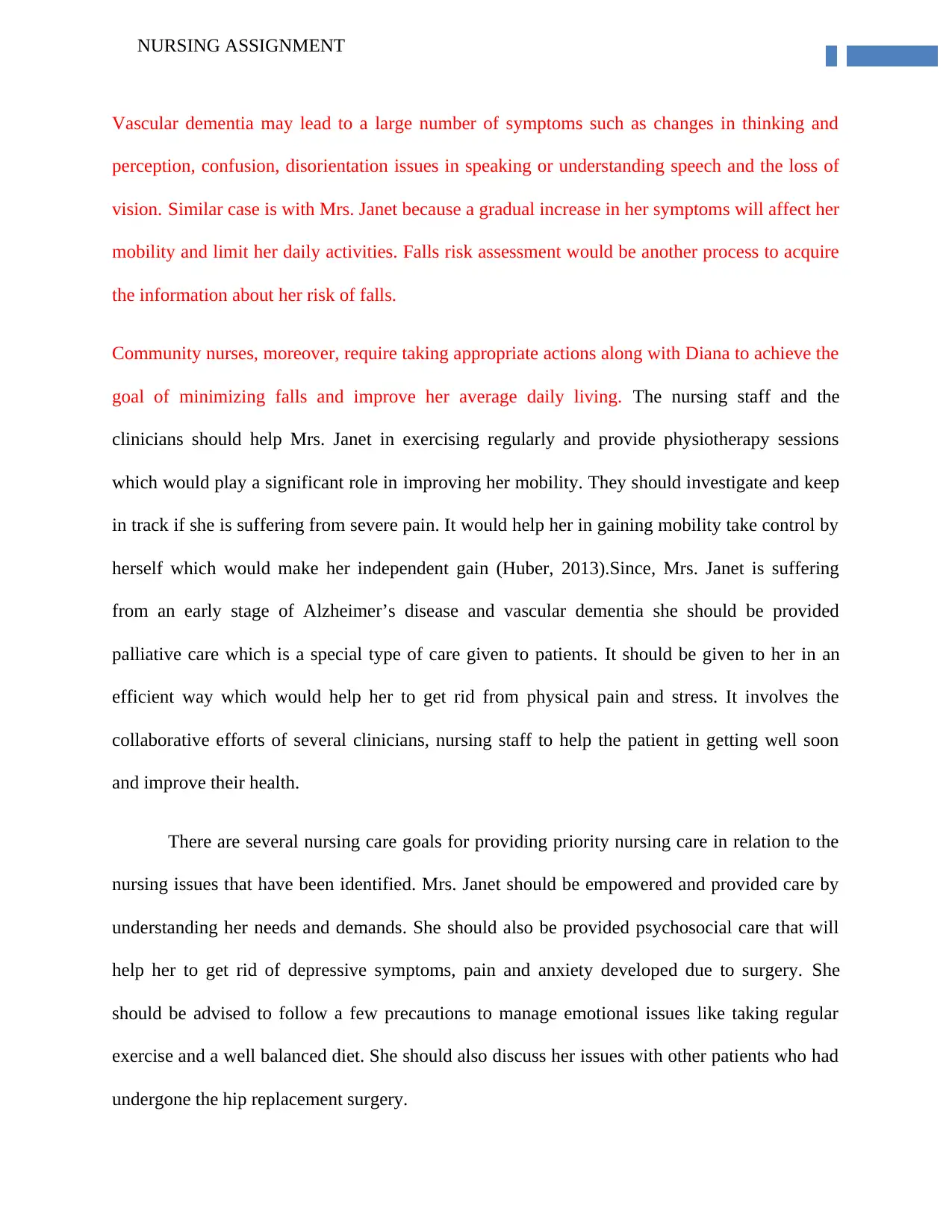
3
NURSING ASSIGNMENT
Vascular dementia may lead to a large number of symptoms such as changes in thinking and
perception, confusion, disorientation issues in speaking or understanding speech and the loss of
vision. Similar case is with Mrs. Janet because a gradual increase in her symptoms will affect her
mobility and limit her daily activities. Falls risk assessment would be another process to acquire
the information about her risk of falls.
Community nurses, moreover, require taking appropriate actions along with Diana to achieve the
goal of minimizing falls and improve her average daily living. The nursing staff and the
clinicians should help Mrs. Janet in exercising regularly and provide physiotherapy sessions
which would play a significant role in improving her mobility. They should investigate and keep
in track if she is suffering from severe pain. It would help her in gaining mobility take control by
herself which would make her independent gain (Huber, 2013).Since, Mrs. Janet is suffering
from an early stage of Alzheimer’s disease and vascular dementia she should be provided
palliative care which is a special type of care given to patients. It should be given to her in an
efficient way which would help her to get rid from physical pain and stress. It involves the
collaborative efforts of several clinicians, nursing staff to help the patient in getting well soon
and improve their health.
There are several nursing care goals for providing priority nursing care in relation to the
nursing issues that have been identified. Mrs. Janet should be empowered and provided care by
understanding her needs and demands. She should also be provided psychosocial care that will
help her to get rid of depressive symptoms, pain and anxiety developed due to surgery. She
should be advised to follow a few precautions to manage emotional issues like taking regular
exercise and a well balanced diet. She should also discuss her issues with other patients who had
undergone the hip replacement surgery.
NURSING ASSIGNMENT
Vascular dementia may lead to a large number of symptoms such as changes in thinking and
perception, confusion, disorientation issues in speaking or understanding speech and the loss of
vision. Similar case is with Mrs. Janet because a gradual increase in her symptoms will affect her
mobility and limit her daily activities. Falls risk assessment would be another process to acquire
the information about her risk of falls.
Community nurses, moreover, require taking appropriate actions along with Diana to achieve the
goal of minimizing falls and improve her average daily living. The nursing staff and the
clinicians should help Mrs. Janet in exercising regularly and provide physiotherapy sessions
which would play a significant role in improving her mobility. They should investigate and keep
in track if she is suffering from severe pain. It would help her in gaining mobility take control by
herself which would make her independent gain (Huber, 2013).Since, Mrs. Janet is suffering
from an early stage of Alzheimer’s disease and vascular dementia she should be provided
palliative care which is a special type of care given to patients. It should be given to her in an
efficient way which would help her to get rid from physical pain and stress. It involves the
collaborative efforts of several clinicians, nursing staff to help the patient in getting well soon
and improve their health.
There are several nursing care goals for providing priority nursing care in relation to the
nursing issues that have been identified. Mrs. Janet should be empowered and provided care by
understanding her needs and demands. She should also be provided psychosocial care that will
help her to get rid of depressive symptoms, pain and anxiety developed due to surgery. She
should be advised to follow a few precautions to manage emotional issues like taking regular
exercise and a well balanced diet. She should also discuss her issues with other patients who had
undergone the hip replacement surgery.
Secure Best Marks with AI Grader
Need help grading? Try our AI Grader for instant feedback on your assignments.
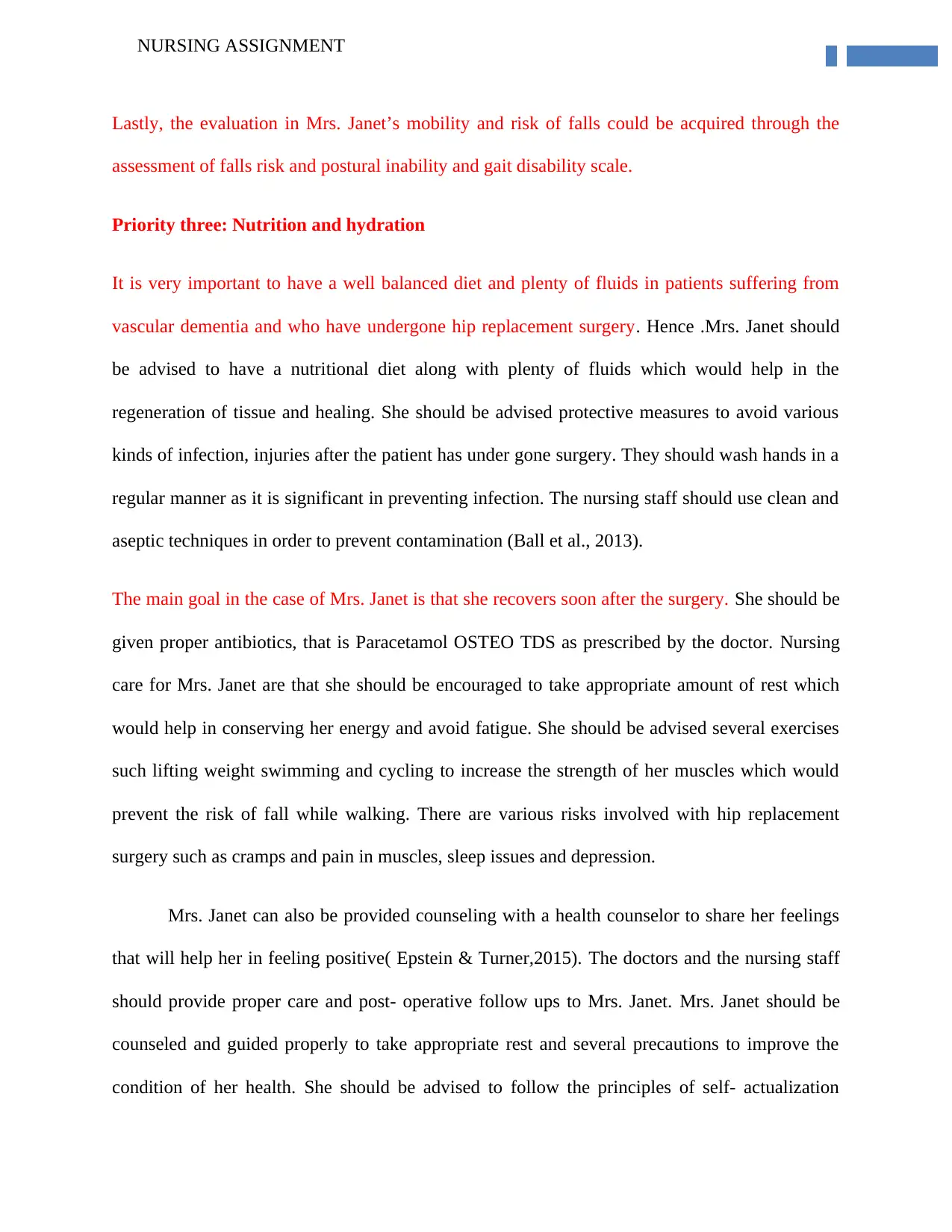
4
NURSING ASSIGNMENT
Lastly, the evaluation in Mrs. Janet’s mobility and risk of falls could be acquired through the
assessment of falls risk and postural inability and gait disability scale.
Priority three: Nutrition and hydration
It is very important to have a well balanced diet and plenty of fluids in patients suffering from
vascular dementia and who have undergone hip replacement surgery. Hence .Mrs. Janet should
be advised to have a nutritional diet along with plenty of fluids which would help in the
regeneration of tissue and healing. She should be advised protective measures to avoid various
kinds of infection, injuries after the patient has under gone surgery. They should wash hands in a
regular manner as it is significant in preventing infection. The nursing staff should use clean and
aseptic techniques in order to prevent contamination (Ball et al., 2013).
The main goal in the case of Mrs. Janet is that she recovers soon after the surgery. She should be
given proper antibiotics, that is Paracetamol OSTEO TDS as prescribed by the doctor. Nursing
care for Mrs. Janet are that she should be encouraged to take appropriate amount of rest which
would help in conserving her energy and avoid fatigue. She should be advised several exercises
such lifting weight swimming and cycling to increase the strength of her muscles which would
prevent the risk of fall while walking. There are various risks involved with hip replacement
surgery such as cramps and pain in muscles, sleep issues and depression.
Mrs. Janet can also be provided counseling with a health counselor to share her feelings
that will help her in feeling positive( Epstein & Turner,2015). The doctors and the nursing staff
should provide proper care and post- operative follow ups to Mrs. Janet. Mrs. Janet should be
counseled and guided properly to take appropriate rest and several precautions to improve the
condition of her health. She should be advised to follow the principles of self- actualization
NURSING ASSIGNMENT
Lastly, the evaluation in Mrs. Janet’s mobility and risk of falls could be acquired through the
assessment of falls risk and postural inability and gait disability scale.
Priority three: Nutrition and hydration
It is very important to have a well balanced diet and plenty of fluids in patients suffering from
vascular dementia and who have undergone hip replacement surgery. Hence .Mrs. Janet should
be advised to have a nutritional diet along with plenty of fluids which would help in the
regeneration of tissue and healing. She should be advised protective measures to avoid various
kinds of infection, injuries after the patient has under gone surgery. They should wash hands in a
regular manner as it is significant in preventing infection. The nursing staff should use clean and
aseptic techniques in order to prevent contamination (Ball et al., 2013).
The main goal in the case of Mrs. Janet is that she recovers soon after the surgery. She should be
given proper antibiotics, that is Paracetamol OSTEO TDS as prescribed by the doctor. Nursing
care for Mrs. Janet are that she should be encouraged to take appropriate amount of rest which
would help in conserving her energy and avoid fatigue. She should be advised several exercises
such lifting weight swimming and cycling to increase the strength of her muscles which would
prevent the risk of fall while walking. There are various risks involved with hip replacement
surgery such as cramps and pain in muscles, sleep issues and depression.
Mrs. Janet can also be provided counseling with a health counselor to share her feelings
that will help her in feeling positive( Epstein & Turner,2015). The doctors and the nursing staff
should provide proper care and post- operative follow ups to Mrs. Janet. Mrs. Janet should be
counseled and guided properly to take appropriate rest and several precautions to improve the
condition of her health. She should be advised to follow the principles of self- actualization
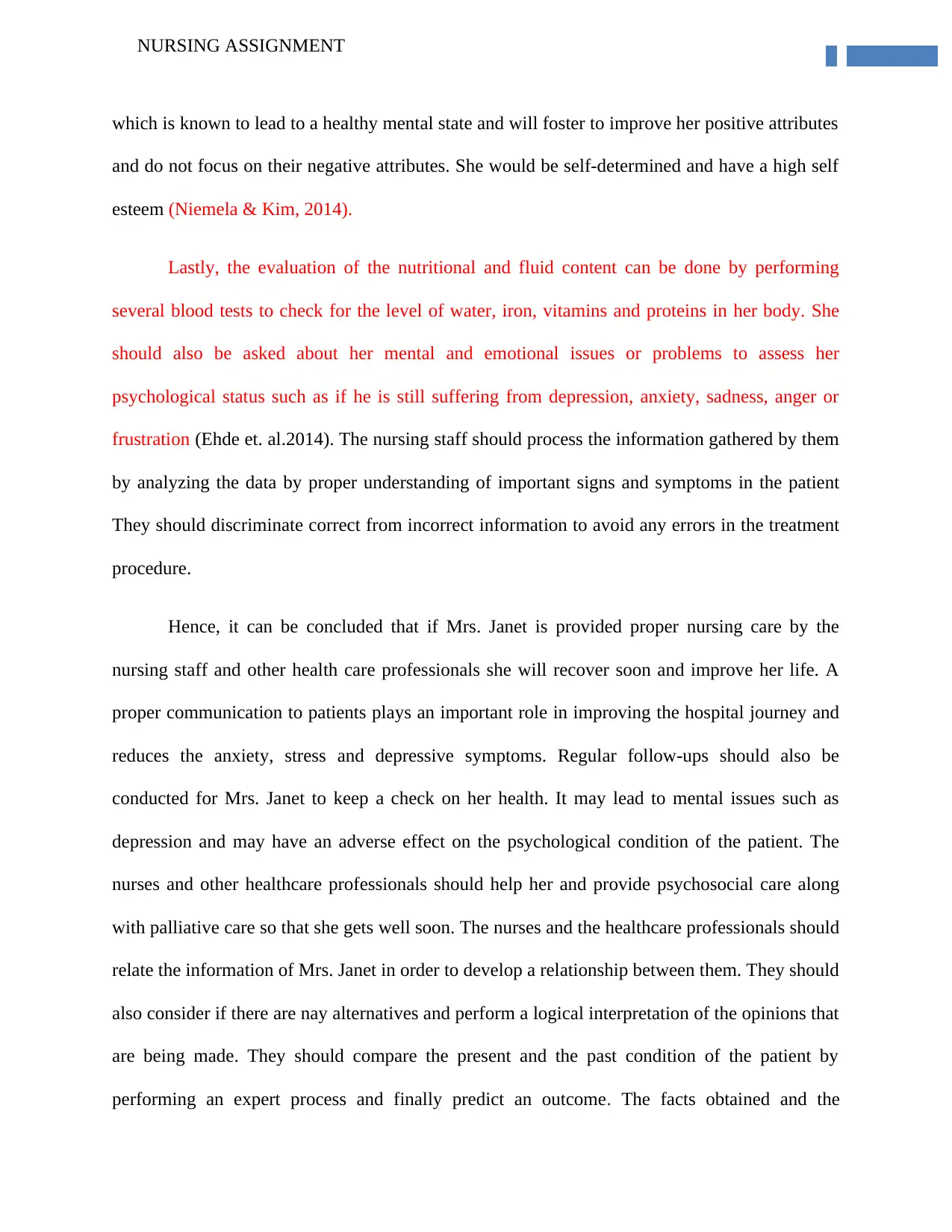
5
NURSING ASSIGNMENT
which is known to lead to a healthy mental state and will foster to improve her positive attributes
and do not focus on their negative attributes. She would be self-determined and have a high self
esteem (Niemela & Kim, 2014).
Lastly, the evaluation of the nutritional and fluid content can be done by performing
several blood tests to check for the level of water, iron, vitamins and proteins in her body. She
should also be asked about her mental and emotional issues or problems to assess her
psychological status such as if he is still suffering from depression, anxiety, sadness, anger or
frustration (Ehde et. al.2014). The nursing staff should process the information gathered by them
by analyzing the data by proper understanding of important signs and symptoms in the patient
They should discriminate correct from incorrect information to avoid any errors in the treatment
procedure.
Hence, it can be concluded that if Mrs. Janet is provided proper nursing care by the
nursing staff and other health care professionals she will recover soon and improve her life. A
proper communication to patients plays an important role in improving the hospital journey and
reduces the anxiety, stress and depressive symptoms. Regular follow-ups should also be
conducted for Mrs. Janet to keep a check on her health. It may lead to mental issues such as
depression and may have an adverse effect on the psychological condition of the patient. The
nurses and other healthcare professionals should help her and provide psychosocial care along
with palliative care so that she gets well soon. The nurses and the healthcare professionals should
relate the information of Mrs. Janet in order to develop a relationship between them. They should
also consider if there are nay alternatives and perform a logical interpretation of the opinions that
are being made. They should compare the present and the past condition of the patient by
performing an expert process and finally predict an outcome. The facts obtained and the
NURSING ASSIGNMENT
which is known to lead to a healthy mental state and will foster to improve her positive attributes
and do not focus on their negative attributes. She would be self-determined and have a high self
esteem (Niemela & Kim, 2014).
Lastly, the evaluation of the nutritional and fluid content can be done by performing
several blood tests to check for the level of water, iron, vitamins and proteins in her body. She
should also be asked about her mental and emotional issues or problems to assess her
psychological status such as if he is still suffering from depression, anxiety, sadness, anger or
frustration (Ehde et. al.2014). The nursing staff should process the information gathered by them
by analyzing the data by proper understanding of important signs and symptoms in the patient
They should discriminate correct from incorrect information to avoid any errors in the treatment
procedure.
Hence, it can be concluded that if Mrs. Janet is provided proper nursing care by the
nursing staff and other health care professionals she will recover soon and improve her life. A
proper communication to patients plays an important role in improving the hospital journey and
reduces the anxiety, stress and depressive symptoms. Regular follow-ups should also be
conducted for Mrs. Janet to keep a check on her health. It may lead to mental issues such as
depression and may have an adverse effect on the psychological condition of the patient. The
nurses and other healthcare professionals should help her and provide psychosocial care along
with palliative care so that she gets well soon. The nurses and the healthcare professionals should
relate the information of Mrs. Janet in order to develop a relationship between them. They should
also consider if there are nay alternatives and perform a logical interpretation of the opinions that
are being made. They should compare the present and the past condition of the patient by
performing an expert process and finally predict an outcome. The facts obtained and the
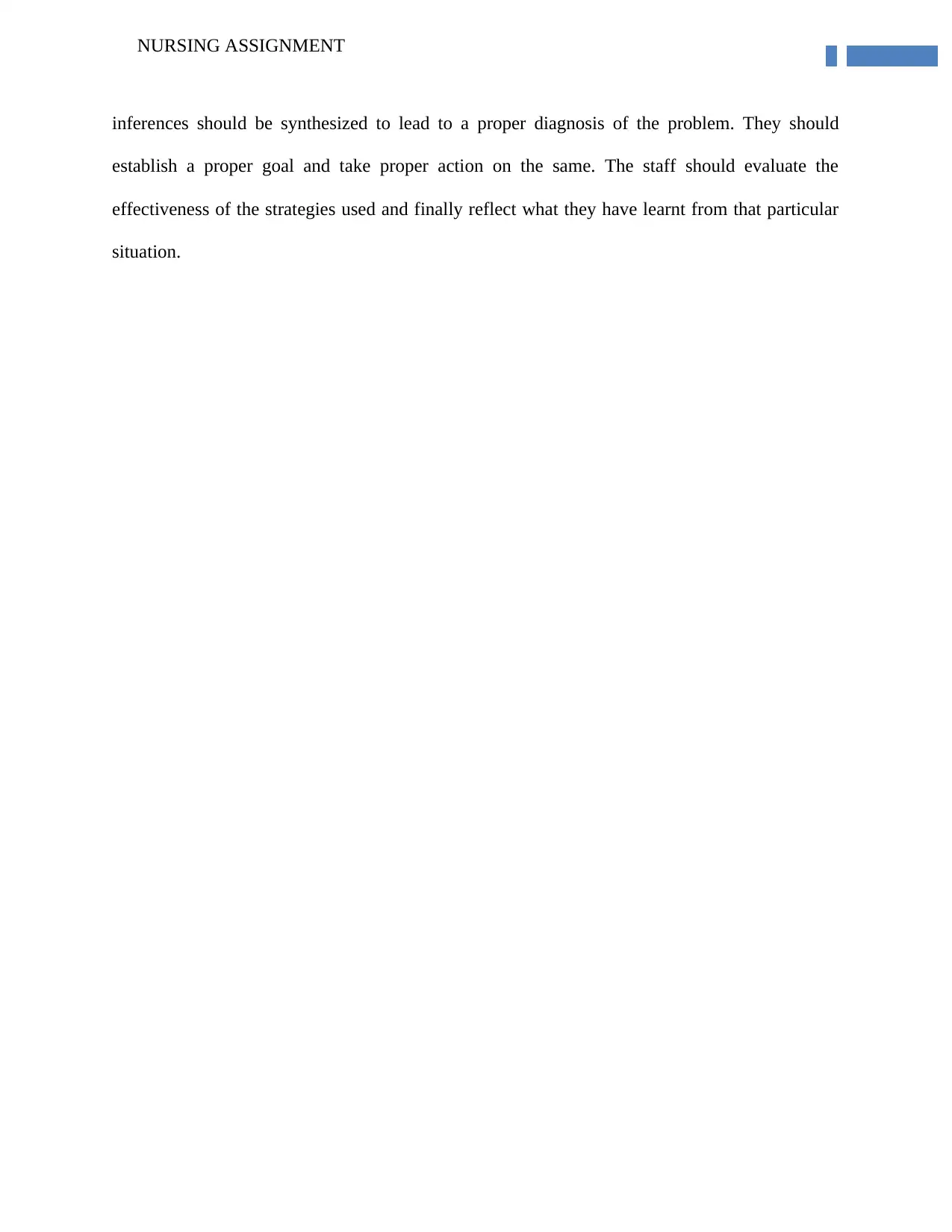
6
NURSING ASSIGNMENT
inferences should be synthesized to lead to a proper diagnosis of the problem. They should
establish a proper goal and take proper action on the same. The staff should evaluate the
effectiveness of the strategies used and finally reflect what they have learnt from that particular
situation.
NURSING ASSIGNMENT
inferences should be synthesized to lead to a proper diagnosis of the problem. They should
establish a proper goal and take proper action on the same. The staff should evaluate the
effectiveness of the strategies used and finally reflect what they have learnt from that particular
situation.
Paraphrase This Document
Need a fresh take? Get an instant paraphrase of this document with our AI Paraphraser
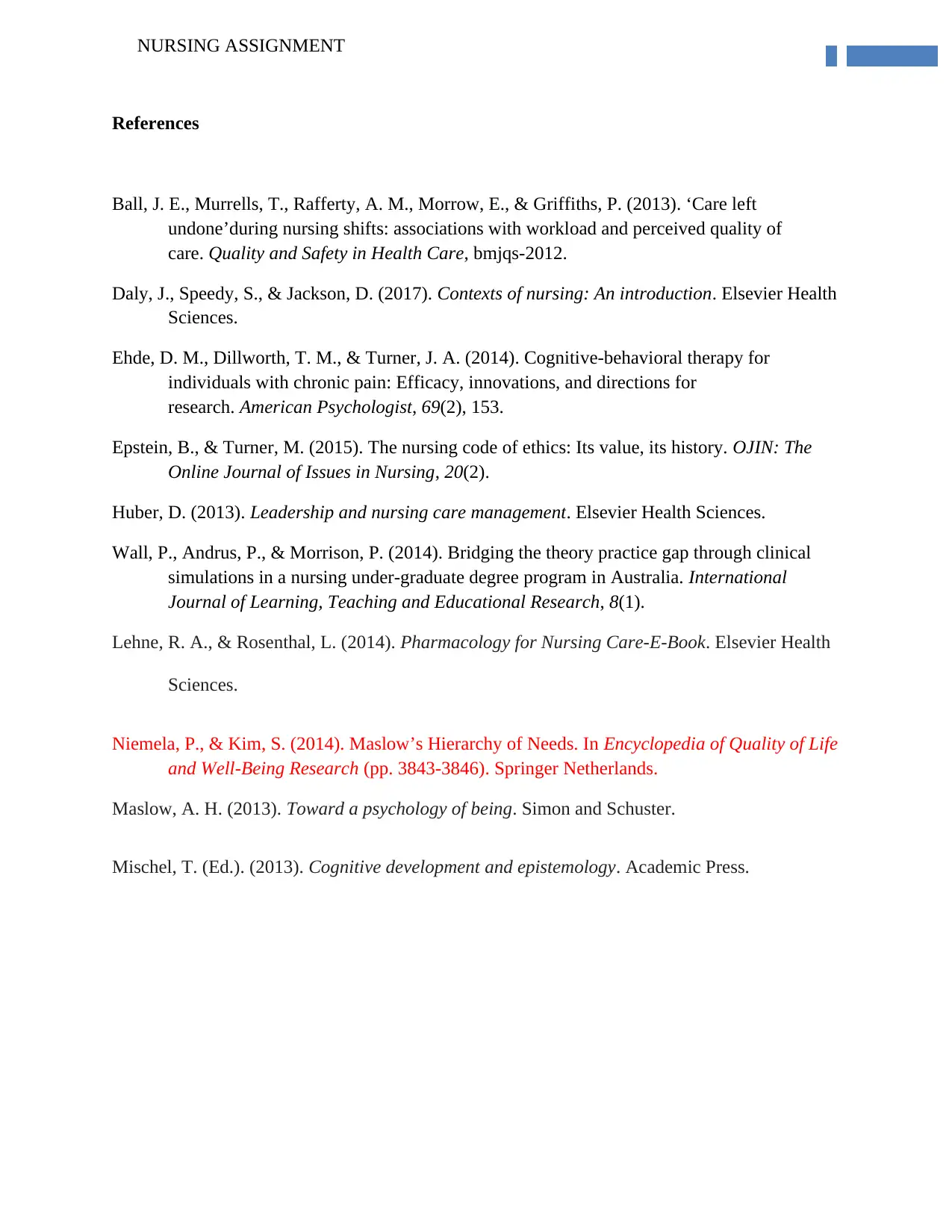
7
NURSING ASSIGNMENT
References
Ball, J. E., Murrells, T., Rafferty, A. M., Morrow, E., & Griffiths, P. (2013). ‘Care left
undone’during nursing shifts: associations with workload and perceived quality of
care. Quality and Safety in Health Care, bmjqs-2012.
Daly, J., Speedy, S., & Jackson, D. (2017). Contexts of nursing: An introduction. Elsevier Health
Sciences.
Ehde, D. M., Dillworth, T. M., & Turner, J. A. (2014). Cognitive-behavioral therapy for
individuals with chronic pain: Efficacy, innovations, and directions for
research. American Psychologist, 69(2), 153.
Epstein, B., & Turner, M. (2015). The nursing code of ethics: Its value, its history. OJIN: The
Online Journal of Issues in Nursing, 20(2).
Huber, D. (2013). Leadership and nursing care management. Elsevier Health Sciences.
Wall, P., Andrus, P., & Morrison, P. (2014). Bridging the theory practice gap through clinical
simulations in a nursing under-graduate degree program in Australia. International
Journal of Learning, Teaching and Educational Research, 8(1).
Lehne, R. A., & Rosenthal, L. (2014). Pharmacology for Nursing Care-E-Book. Elsevier Health
Sciences.
Niemela, P., & Kim, S. (2014). Maslow’s Hierarchy of Needs. In Encyclopedia of Quality of Life
and Well-Being Research (pp. 3843-3846). Springer Netherlands.
Maslow, A. H. (2013). Toward a psychology of being. Simon and Schuster.
Mischel, T. (Ed.). (2013). Cognitive development and epistemology. Academic Press.
NURSING ASSIGNMENT
References
Ball, J. E., Murrells, T., Rafferty, A. M., Morrow, E., & Griffiths, P. (2013). ‘Care left
undone’during nursing shifts: associations with workload and perceived quality of
care. Quality and Safety in Health Care, bmjqs-2012.
Daly, J., Speedy, S., & Jackson, D. (2017). Contexts of nursing: An introduction. Elsevier Health
Sciences.
Ehde, D. M., Dillworth, T. M., & Turner, J. A. (2014). Cognitive-behavioral therapy for
individuals with chronic pain: Efficacy, innovations, and directions for
research. American Psychologist, 69(2), 153.
Epstein, B., & Turner, M. (2015). The nursing code of ethics: Its value, its history. OJIN: The
Online Journal of Issues in Nursing, 20(2).
Huber, D. (2013). Leadership and nursing care management. Elsevier Health Sciences.
Wall, P., Andrus, P., & Morrison, P. (2014). Bridging the theory practice gap through clinical
simulations in a nursing under-graduate degree program in Australia. International
Journal of Learning, Teaching and Educational Research, 8(1).
Lehne, R. A., & Rosenthal, L. (2014). Pharmacology for Nursing Care-E-Book. Elsevier Health
Sciences.
Niemela, P., & Kim, S. (2014). Maslow’s Hierarchy of Needs. In Encyclopedia of Quality of Life
and Well-Being Research (pp. 3843-3846). Springer Netherlands.
Maslow, A. H. (2013). Toward a psychology of being. Simon and Schuster.
Mischel, T. (Ed.). (2013). Cognitive development and epistemology. Academic Press.
1 out of 8
Related Documents
Your All-in-One AI-Powered Toolkit for Academic Success.
+13062052269
info@desklib.com
Available 24*7 on WhatsApp / Email
![[object Object]](/_next/static/media/star-bottom.7253800d.svg)
Unlock your academic potential
© 2024 | Zucol Services PVT LTD | All rights reserved.




